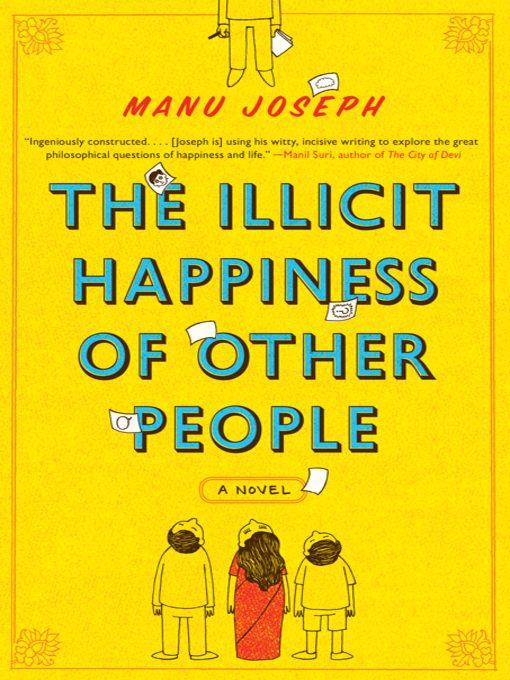
The Illicit Happiness of Other People
A Novel
- اطلاعات
- نقد و بررسی
- دیدگاه کاربران
نقد و بررسی

October 1, 2012
Indian author Joseph’s smart new novel, after 2010’s PEN/Open Book Award–winning Serious Men, is laced with black humor and keen observations on human nature. Three years after 17-year-old Unni Chacko, a budding cartoonist, plunged from his third-floor terrace, his father, Ousep, resumes his obsessive search for the truth behind his death, using his son’s funny and contemplative comics as guides in his quest through modern-day India. Ousep, a journalist, spends his days interrogating those who knew Unni, and his nights drunkenly waking his neighbors upon his return home. His wife, Mariamma, tries to protect their younger son, Thoma, from Ousep’s harmless but humiliating alcoholic rages, while Thoma struggles to impress the beautiful Mythili, one of the brothers’ closest friends. What Ousep discovers, after interviewing Unni’s friends, fellow artists, teachers, and anyone else he can track down, is a deeply thoughtful teenager burdened by weighty existential quandaries. Joseph’s rich characters intersect in moments of tenderness, yet each continues along a path that gracefully highlights the titular Other and the emotional divides that separate individuals. Lucky for us, Joseph’s empathic prose deftly bridges those gaps. Agent: Isobel Dixon, Blake Friedmann Literary Agency.

Starred review from November 1, 2012
Ousep Chacko searches for the meaning of the death of his son Unni, who three years earlier had fallen--or perhaps thrown himself?--off a balcony. A reporter with United News of India, Ousep has become obsessed with discovering the events surrounding his son's death. There's no question that Unni had some strange quirks, but it's not clear to Ousep whether his views and behavior were unconventional or bizarre enough to sustain a diagnosis of schizophrenia. Unni had died at the age of 17 and had shown some talent as an artist, especially as a cartoonist, so Ousep starts to scrutinize some of his son's cartoons, hoping to find hints of his fate. In one disturbing series, Unni depicted friends and family as corpses, and he had cryptically confessed to a friend: "I know a corpse." Another series also preys on Ousep's mind, a sequence of cartoons with "bubbles" for dialogue, though Unni had not had time to ink in the words, so the story he intended to create remains forever perplexing and elusive. Ousep becomes convinced that the secret of his son's demise lies with two of his friends, Sai and Somen, so he pursues them relentlessly, almost to the verge of stalking. He pumps them for information that they're unwilling to yield--though perhaps they know nothing at all. Ousep begins to haunt Somen's house at all hours, trying to catch a glimpse of him and engage him in conversation, but Somen's parents continually deny that he's home. Finally, at the end of the novel, Somen emerges from his room, where he's remained for the previous two years, to explain to Ousep Unni's unnerving and elliptical take on reality. Joseph writes with extraordinary wit, cunning and sympathy about both family relationships and ultimate mysteries.
COPYRIGHT(2012) Kirkus Reviews, ALL RIGHTS RESERVED.

April 1, 2013
Still baffled by the apparent suicide of his 17-year-old son three years earlier, a henpecked father tries to make sense of his son's quest for meaning in multicultural Madras.
Copyright 2013 Library Journal, LLC Used with permission.

November 1, 2012
Joseph's sublime new novel takes place in early 1990s Madras, India, where Ousep Chacko has reinvigorated his pursuit for the truth about his son Unni's inexplicable death three years ago. An aspiring cartoonist well known in the community, Unni was mere weeks from his eighteenth birthday when he deliberately lept from his family's third-floor balcony. The question that no one can answer, of course, is why. Ousep, a journalist and neighborhood drunk, obsessively pours through Unni's drawings, searching for clues his son may have left behind, and relentlessly hounds his son's former classmates and fellow cartoon enthusiasts for information. Meanwhile, Ousep's fixation impacts his wife, Mariamma, a fiercely protective woman who has long-suffered Ousep's nightly alcohol-induced obstreperousness. Also affected is their young son, Thoma, who is drawn to the older girl next door, who holds her own secrets about Unni. As Ousep's investigation continues, the fissures in Unni's story are slowly revealed. Joseph's witty narrative adds depth and vigor to the Chacko family's tale and assuredly explores the complexity of self-perception amidst present-day life.(Reprinted with permission of Booklist, copyright 2012, American Library Association.)




دیدگاه کاربران